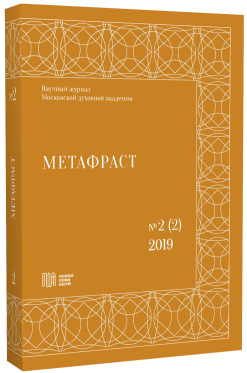Origen’s Exegesis as Evidence of the Constancy of His Universalist Ideas
DOI:
https://doi.org/10.31802/2658-770X-2019-2-2-24-39Keywords:
Origen, apokatastasis, universalism, eschatology, exegesis, First CorinthiansAbstract
In this article it is argued that Origen did not abandon his universalist ideas in the late period of his career. In his monograph, Ronald D. Heine made some remarks in favour of the plausibility of such a change in Origen’s eschatology. Disagreeing with Heine’s position and using as evidence Origen’s interpretation of 1 Cor. 15, 24-28, the author of the article demonstrates that Origen always remained faithful to his concept of universal restoration. The argumentation is based on such works by Origen as «Commentary on the Gospel according to John» and «Homilies on Leviticus». In this article, a particular emphasis is made on the fact that a sharp sense of eschatological tension was intrinsic to Origen’s universalism.
Downloads
References
ИСТОЧНИКИ
Eusebius Caesariensis. Historia ecclesiastica // Eusèbe de Césarée. Histoire ecclésiastique.
Livres V–VII / éd. et trad. par G. Bardy. Paris: Cerf, 1955. (SС; vol. 41). P. 4–231.
Hanson R. P. C. Allegory and Event: A Study of the Sources and Significance of Origen’s Interpretation of Scripture. London, 1959. P. 341.
Origenes. Commentarii in Epistulam ad Romanos // Origène. Commentaire sur l’Épitre aux Romains. T. 4 / texte critique par C. P. Hammond Bammel. Paris: Cerf, 2012. (SС; vol. 555). P. 62–448.
Origenes. Commentarii in Evangelium Joannis // Origène. Commentaire sur saint Jean. T.1 / éd. et trad. par C. Blanc. Paris: Cerf, 1966. (SС; vol. 120). P. 56–390.
Origenes. Commentarii in Evangelium Joannis // Origène. Commentaire sur saint Jean. T. 2 / éd. et trad. par C. Blanc. Paris: Cerf, 1970. (SС; vol. 157). P. 128–580.
Origenes. Commentarii in Evangelium Joannis // Origène. Commentaire sur saint Jean. T. 5 / éd. et trad. par C. Blanc. Paris: Cerf, 1992. (SС; vol. 385). P. 58–360.
Origenes. Homiliae in Leviticum // Origène. Homélies sur le Lévitique. T. 1 / éd. et trad. M. Borret. Paris: Cerf, 1981. (SС; vol. 286). P. 66–352.
Origenes. Homiliae in Leviticum // Origène. Homélies sur le Lévitique. T. 2 / éd. et trad. M. Borret. Paris: Cerf, 1981. (SС; vol. 287). P. 8–300.
Plotinus. Enneades // Plotini opera. Vol. 3 / ed. P. Henry, H.-R. Schwyzer. Paris: Desclée de Brouwer; Bruxelles: L’Édition universelle. 1973. (Museum Lessianum. Series philosophica; 35). P. 2–328.
ЛИТЕРАТУРА
Crouzel H. Origen / trans. by A. S. Worrall. Edinburgh: T&T Clark, 1989.
Hanson R. P. C. Allegory and Event: A Study of the Sources and Significance of Origen’s Interpretation of Scripture. London: SCM Press, 1959.
Heine R. E. Origen: Scholarship in the Service of the Church. Oxford: University Press, 2010. (Christian Theology in Context).
Ramelli I. L. E. Christian Soteriology and Christian Platonism: Origen, Gregory of Nyssa, and the Biblical and Philosophical Basis of the Doctrine of Apokatastasis // Vigiliae christianae. 2007. Vol. 61. P. 313–356.
Zander J. Gnostic Ideas on the Fall and Salvation // Numen. 1964. Vol. 11. P. 13–74.
Downloads
Published
How to Cite
Issue
Section
Categories
License

This work is licensed under a Creative Commons Attribution-ShareAlike 4.0 International License.






